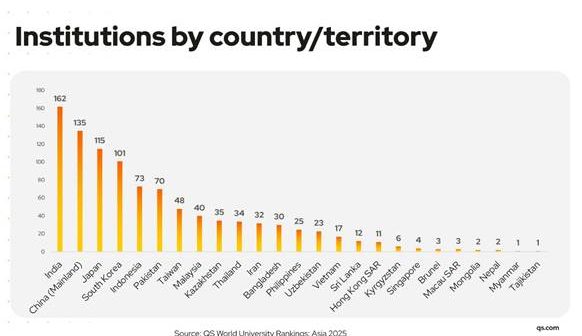The QS World University Rankings: Asia 2025 showcase a remarkable achievement for India’s higher education sector, with seven Indian institutions breaking into the top 100 universities in Asia. This year’s rankings, released by global higher education analyst QS, underscore India’s steady rise in academic and research excellence and its strong positioning in key areas like internationalization and innovation. Among India’s top-ranked institutions is the Indian Institute of Technology Delhi (IITD), which climbed to 44th place, making it the highest-ranking Indian institute. IIT Bombay follows closely at 48th place, with both institutions recognized for their high employer reputation scores, establishing them as leaders in academic quality and industry relevance in Asia.
Highlighting India’s Progress in Asian Higher Education
The QS Asia Rankings for 2025 assessed 984 universities across 25 countries in Eastern, Southern, South-Eastern, and Central Asia. India’s performance stands out, not only in the number of institutions listed but also in the quality and impact of these institutions. Indian universities dominate the top 10 spots in Southern Asia, underscoring the country’s growing influence in the region’s academic landscape.
The rankings spotlight India’s academic and research advancements, as well as its commitment to improving global education standards. India’s two institutions in the top 50 and seven in the top 100 signify substantial progress, particularly in categories like Papers per Faculty and Staff with PhD, where India’s institutions achieved some of their highest scores. The QS report also highlights India’s rapid growth, with the number of Indian institutions in the rankings rising from 11 in 2015 to 46 in 2025 – a 318% increase over the past decade, and the largest rise among G20 countries.
Top Performers and Key Metrics
Here are India’s top-ranking universities in the QS Asia 2025 Rankings and the notable metrics they excelled in:
- Top 50: Indian Institute of Technology Delhi (IITD) ranks at 44th, the highest for an Indian institution, climbing up from 46th last year with an employer reputation score of 99%. Following IITD is IIT Bombay at 48th place, which boasts an employer reputation score of 99.5% and an academic reputation score of 96.6%.
- Top 100: Five other Indian institutions join the top 100. They include IIT Madras (56th), IIT Kharagpur (60th), the Indian Institute of Science (62nd), IIT Kanpur (67th), and the University of Delhi (81st), marking India’s robust standing in Asia’s academic landscape.
- Top 150: Other top-performing institutions include IIT Guwahati, IIT Roorkee, Jawaharlal Nehru University, Chandigarh University (120th), University of Petroleum and Energy Studies (UPES) at 148th, and Vellore Institute of Technology (150th). UPES recorded the most significant improvement, jumping 70 places due to gains in nine of the 11 ranking metrics, with particular strengths in the International Research Network, Citations per Paper, and Papers per Faculty indicators.
Noteworthy Achievements
The performance of India’s universities highlights strengths in research productivity and academic quality, especially in areas such as Papers per Faculty and Staff with PhD, which reflect India’s ongoing commitment to fostering excellence in higher education. Some of the significant achievements in the rankings include:
- University of Delhi: The University of Delhi made an impressive jump from 94th to 81st place, achieving a high score of 96.4% in the International Research Network indicator, showcasing its success in global research partnerships.
- Anna University: Achieved a perfect score of 100 in the Papers per Faculty indicator, underlining its high research output and contributing to India’s academic influence in Asia.
- North Eastern Hill University and University of Agricultural Sciences, Bangalore: Both institutions earned a perfect score of 100 in the Faculty-Student Ratio indicator, emphasizing their commitment to academic accessibility and quality teaching.
- Employer Reputation Scores: IIT Delhi and IIT Bombay secured employer reputation scores of 99% and 99.5% respectively, reflecting the strong industry connections and employability prospects for graduates of these institutions.
India’s Commitment to Academic Excellence and Global Competitiveness
India’s growth in the QS Asia Rankings signals its commitment to fostering a globally competitive education system. With two institutions in the top 50, seven in the top 100, and several other universities placing within the top 150, India has demonstrated its capability to deliver quality education and impactful research. This achievement also highlights the government’s role in promoting higher education through strategic initiatives and the establishment of centers for excellence.
The increased number of Indian institutions in the 2025 QS rankings further demonstrates India’s dedication to establishing itself as a global leader in education. This accomplishment reflects India’s ability to balance robust academic and research outputs, high-quality teaching, and strong employer connections, creating a well-rounded educational environment that meets international standards.
Looking Forward
India’s education sector is positioned for further growth, both within Asia and on the global stage, as it continues to invest in research, enhance teaching standards, and strengthen industry partnerships. The presence of seven institutions in Asia’s top 100 underlines the success of India’s strategic approach to higher education and its significant role in shaping the future of academia in Asia.
With ongoing advancements, India is well on its way to solidifying its status as a formidable competitor in global education. The achievements highlighted in the QS Asia Rankings 2025 offer a promising outlook, showcasing India’s transformation into a hub of quality higher learning and research excellence that can cater to a dynamic and interconnected world.





